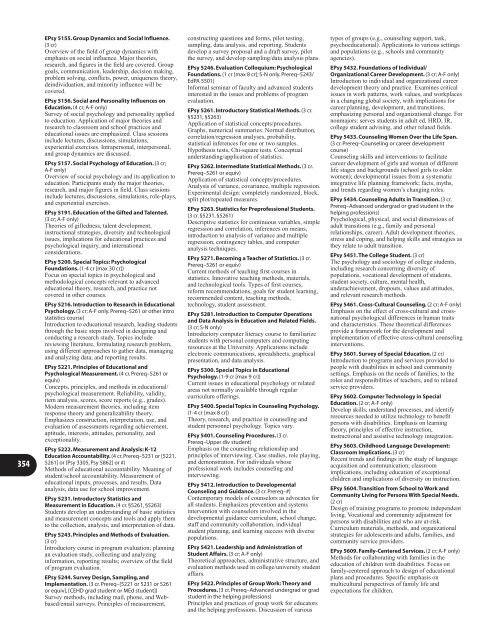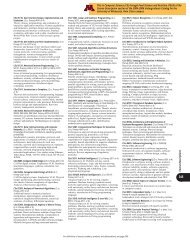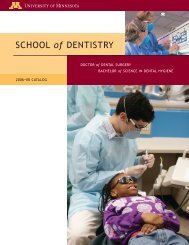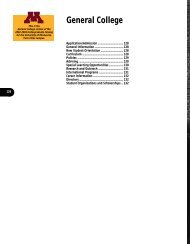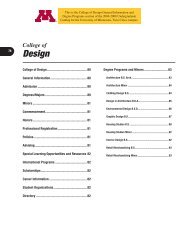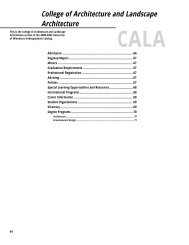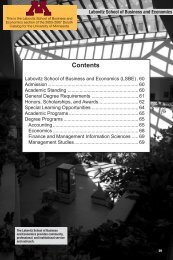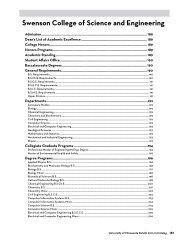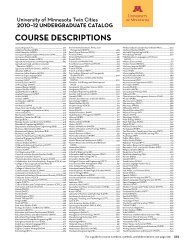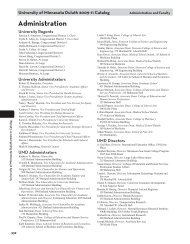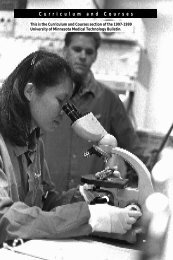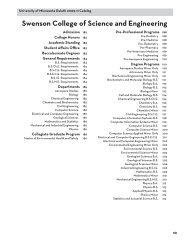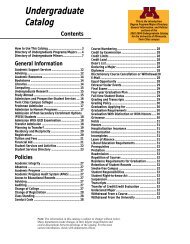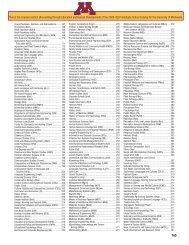CoursesâA through G and course numbers and symbols key
CoursesâA through G and course numbers and symbols key
CoursesâA through G and course numbers and symbols key
- No tags were found...
Create successful ePaper yourself
Turn your PDF publications into a flip-book with our unique Google optimized e-Paper software.
354EPsy 5155. Group Dynamics <strong>and</strong> Social Influence.(3 cr)Overview of the field of group dynamics withemphasis on social influence. Major theories,research, <strong>and</strong> figures in the field are covered. Groupgoals, communication, leadership, decision making,problem solving, conflicts, power, uniqueness theory,deindividuation, <strong>and</strong> minority influence will becovered.EPsy 5156. Social <strong>and</strong> Personality Influences onEducation. (4 cr; A-F only)Survey of social psychology <strong>and</strong> personality appliedto education. Application of major theories <strong>and</strong>research to classroom <strong>and</strong> school practices <strong>and</strong>educational issues are emphasized. Class sessionsinclude lectures, discussions, simulations,experiential exercises. Intrapersonal, interpersonal,<strong>and</strong> group dynamics are discussed.EPsy 5157. Social Psychology of Education. (3 cr;A-F only)Overview of social psychology <strong>and</strong> its application toeducation. Participants study the major theories,research, <strong>and</strong> major figures in field. Class sessionsinclude lectures, discussions, simulations, role-plays,<strong>and</strong> experiential exercises.EPsy 5191. Education of the Gifted <strong>and</strong> Talented.(3 cr; A-F only)Theories of giftedness, talent development,instructional strategies, diversity <strong>and</strong> technologicalissues, implications for educational practices <strong>and</strong>psychological inquiry, <strong>and</strong> internationalconsiderations.EPsy 5200. Special Topics: PsychologicalFoundations. (1-4 cr [max 30 cr])Focus on special topics in psychological <strong>and</strong>methodological concepts relevant to advancededucational theory, research, <strong>and</strong> practice notcovered in other <strong>course</strong>s.EPsy 5216. Introduction to Research in EducationalPsychology. (3 cr; A-F only. Prereq–5261 or other introstatistics <strong>course</strong>)Introduction to educational research, leading students<strong>through</strong> the basic steps involved in designing <strong>and</strong>conducting a research study. Topics includereviewing literature, formulating research problem,using different approaches to gather data, managing<strong>and</strong> analyzing data, <strong>and</strong> reporting results.EPsy 5221. Principles of Educational <strong>and</strong>Psychological Measurement. (4 cr. Prereq–5261 orequiv)Concepts, principles, <strong>and</strong> methods in educational/psychological measurement. Reliability, validity,item analysis, scores, score reports (e.g., grades).Modern measurement theories, including itemresponse theory <strong>and</strong> generalizability theory.Emphasizes construction, interpretation, use, <strong>and</strong>evaluation of assessments regarding achievement,aptitude, interests, attitudes, personality, <strong>and</strong>exceptionality.EPsy 5222. Measurement <strong>and</strong> Analysis: K-12Education Accountability. (4 cr. Prereq–5231 or [5221,5261] or [Psy 3305, Psy 5862] or #)Methods of educational accountability. Meaning ofstudent/school accountability. Measurement ofeducational inputs, processes, <strong>and</strong> results. Dataanalysis, data use for school improvement.EPsy 5231. Introductory Statistics <strong>and</strong>Measurement in Education. (4 cr. §5261, §5263)Students develop an underst<strong>and</strong>ing of basic statistics<strong>and</strong> measurement concepts <strong>and</strong> tools <strong>and</strong> apply themto the collection, analysis, <strong>and</strong> interpretation of data.EPsy 5243. Principles <strong>and</strong> Methods of Evaluation.(3 cr)Introductory <strong>course</strong> in program evaluation; planningan evaluation study, collecting <strong>and</strong> analyzinginformation, reporting results; overview of the fieldof program evaluation.EPsy 5244. Survey Design, Sampling, <strong>and</strong>Implementation. (3 cr. Prereq–[5221 or 5231 or 5261or equiv], [CEHD grad student or MEd student])Survey methods, including mail, phone, <strong>and</strong> Webbased/emailsurveys. Principles of measurement,constructing questions <strong>and</strong> forms, pilot testing,sampling, data analysis, <strong>and</strong> reporting. Studentsdevelop a survey proposal <strong>and</strong> a draft survey, pilotthe survey, <strong>and</strong> develop sampling/data analysis plans.EPsy 5246. Evaluation Colloquium: PsychologicalFoundations. (1 cr [max 8 cr]; S-N only. Prereq–5243/EdPA 5501)Informal seminar of faculty <strong>and</strong> advanced studentsinterested in the issues <strong>and</strong> problems of programevaluation.EPsy 5261. Introductory Statistical Methods. (3 cr.§5231, §5263)Application of statistical concepts/procedures.Graphs, numerical summaries. Normal distribution,correlation/regression analyses, probability,statistical inferences for one or two samples.Hypothesis tests, Chi-square tests. Conceptualunderst<strong>and</strong>ing/application of statistics.EPsy 5262. Intermediate Statistical Methods. (3 cr.Prereq–5261 or equiv)Application of statistical concepts/procedures.Analysis of variance, covariance, multiple regression.Experimental design: completely r<strong>and</strong>omized, block,split plot/repeated measures.EPsy 5263. Statistics for Preprofessional Students.(3 cr. §5231, §5261)Descriptive statistics for continuous variables, simpleregression <strong>and</strong> correlation, inferences on means,introduction to analysis of variance <strong>and</strong> multipleregression, contingency tables, <strong>and</strong> computeranalysis techniques.EPsy 5271. Becoming a Teacher of Statistics. (3 cr.Prereq–5261 or equiv)Current methods of teaching first <strong>course</strong>s instatistics. Innovative teaching methods, materials,<strong>and</strong> technological tools. Types of first <strong>course</strong>s,reform recommendations, goals for student learning,recommended content, teaching methods,technology, student assessment.EPsy 5281. Introduction to Computer Operations<strong>and</strong> Data Analysis in Education <strong>and</strong> Related Fields.(3 cr; S-N only)Introductory computer literacy <strong>course</strong> to familiarizestudents with personal computers <strong>and</strong> computingresources at the University. Applications includeelectronic communications, spreadsheets, graphicalpresentation, <strong>and</strong> data analysis.EPsy 5300. Special Topics in EducationalPsychology. (1-9 cr [max 9 cr])Current issues in educational psychology or relatedareas not normally available <strong>through</strong> regularcurriculum offerings.EPsy 5400. Special Topics in Counseling Psychology.(1-4 cr [max 8 cr])Theory, research, <strong>and</strong> practice in counseling <strong>and</strong>student personnel psychology. Topics vary.EPsy 5401. Counseling Procedures. (3 cr.Prereq–Upper div student)Emphasis on the counseling relationship <strong>and</strong>principles of interviewing. Case studies, role playing,<strong>and</strong> demonstration. For individuals whoseprofessional work includes counseling <strong>and</strong>interviewing.EPsy 5412. Introduction to DevelopmentalCounseling <strong>and</strong> Guidance. (3 cr. Prereq–#)Contemporary models of counselors as advocates forall students. Emphasizes prevention <strong>and</strong> systemsintervention with counselors involved in thedevelopmental guidance curriculum, school change,staff <strong>and</strong> community collaboration, individualstudent planning, <strong>and</strong> learning success with diversepopulations.EPsy 5421. Leadership <strong>and</strong> Administration ofStudent Affairs. (3 cr; A-F only)Theoretical approaches, administrative structure, <strong>and</strong>evaluation methods used in college/university studentaffairs.EPsy 5422. Principles of Group Work: Theory <strong>and</strong>Procedures. (3 cr. Prereq–Advanced undergrad or gradstudent in the helping professions)Principles <strong>and</strong> practices of group work for educators<strong>and</strong> the helping professions. Discussion of varioustypes of groups (e.g., counseling support, task,psychoeducational). Applications to various settings<strong>and</strong> populations (e.g., schools <strong>and</strong> communityagencies).EPsy 5432. Foundations of Individual/Organizational Career Development. (3 cr; A-F only)Introduction to individual <strong>and</strong> organizational careerdevelopment theory <strong>and</strong> practice. Examines criticalissues in work patterns, work values, <strong>and</strong> workplacesin a changing global society, with implications forcareer planning, development, <strong>and</strong> transitions,emphasizing personal <strong>and</strong> organizational change. Fornonmajors: serves students in adult ed, HRD, IR,college student advising, <strong>and</strong> other related fields.EPsy 5433. Counseling Women Over the Life Span.(3 cr. Prereq–Counseling or career development<strong>course</strong>)Counseling skills <strong>and</strong> interventions to facilitatecareer development of girls <strong>and</strong> women of differentlife stages <strong>and</strong> backgrounds (school girls to olderwomen); developmental issues from a systematicintegrative life planning framework; facts, myths,<strong>and</strong> trends regarding women’s changing roles.EPsy 5434. Counseling Adults in Transition. (3 cr.Prereq–Advanced undergrad or grad student in thehelping professions)Psychological, physical, <strong>and</strong> social dimensions ofadult transitions (e.g., family <strong>and</strong> personalrelationships, career). Adult development theories,stress <strong>and</strong> coping, <strong>and</strong> helping skills <strong>and</strong> strategies asthey relate to adult transition.EPsy 5451. The College Student. (3 cr)The psychology <strong>and</strong> sociology of college students,including research concerning diversity ofpopulations, vocational development of students,student society, culture, mental health,underachievement, dropouts, values <strong>and</strong> attitudes,<strong>and</strong> relevant research methods.EPsy 5461. Cross-Cultural Counseling. (2 cr; A-F only)Emphasis on the effect of cross-cultural <strong>and</strong> crossnationalpsychological differences in human traits<strong>and</strong> characteristics. These theoretical differencesprovide a framework for the development <strong>and</strong>implementation of effective cross-cultural counselinginterventions.EPsy 5601. Survey of Special Education. (2 cr)Introduction to programs <strong>and</strong> services provided topeople with disabilities in school <strong>and</strong> communitysettings. Emphasis on the needs of families, to theroles <strong>and</strong> responsibilities of teachers, <strong>and</strong> to relatedservice providers.EPsy 5602. Computer Technology in SpecialEducation. (2 cr; A-F only)Develop skills, underst<strong>and</strong> processes, <strong>and</strong> identifyresources needed to utilize technology to benefitpersons with disabilities. Emphasis on learningtheory, principles of effective instruction,instructional <strong>and</strong> assistive technology integration.EPsy 5603. Childhood Language Development:Classroom Implications. (3 cr)Recent trends <strong>and</strong> findings in the study of languageacquisition <strong>and</strong> communication; classroomimplications, including education of exceptionalchildren <strong>and</strong> implications of diversity on instruction.EPsy 5604. Transition from School to Work <strong>and</strong>Community Living for Persons With Special Needs.(2 cr)Design of training programs to promote independentliving. Vocational <strong>and</strong> community adjustment forpersons with disabilities <strong>and</strong> who are at-risk.Curriculum materials, methods, <strong>and</strong> organizationalstrategies for adolescents <strong>and</strong> adults, families, <strong>and</strong>community service providers.EPsy 5609. Family-Centered Services. (2 cr; A-F only)Methods for collaborating with families in theeducation of children with disabilities. Focus onfamily-centered approach to design of educationalplans <strong>and</strong> procedures. Specific emphasis onmulticultural perspectives of family life <strong>and</strong>expectations for children.


